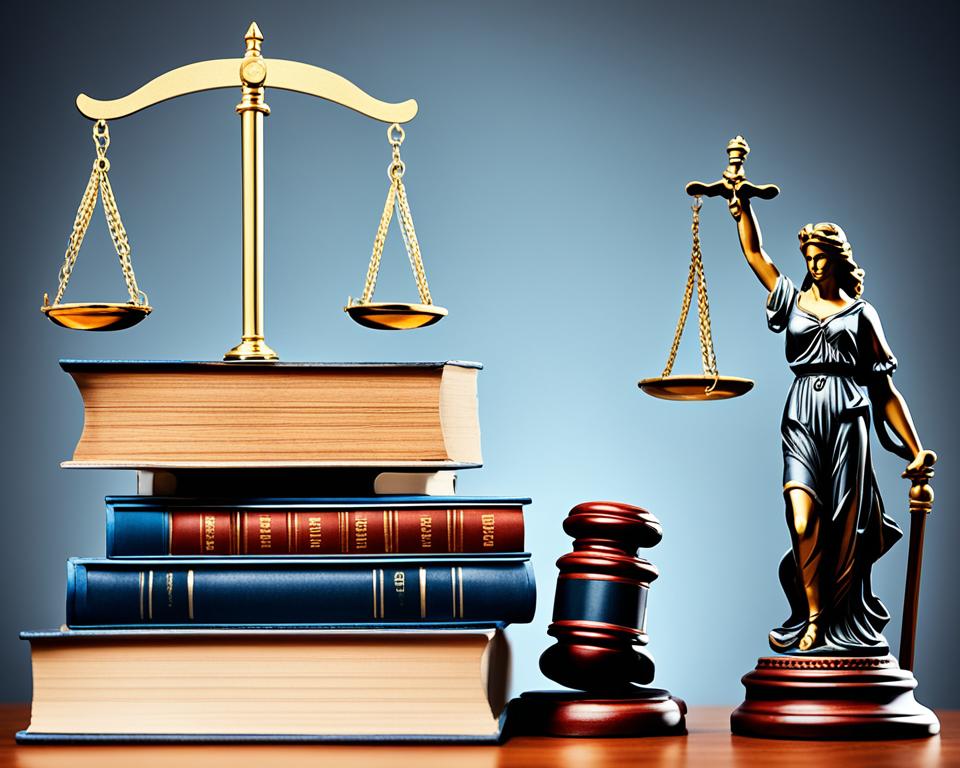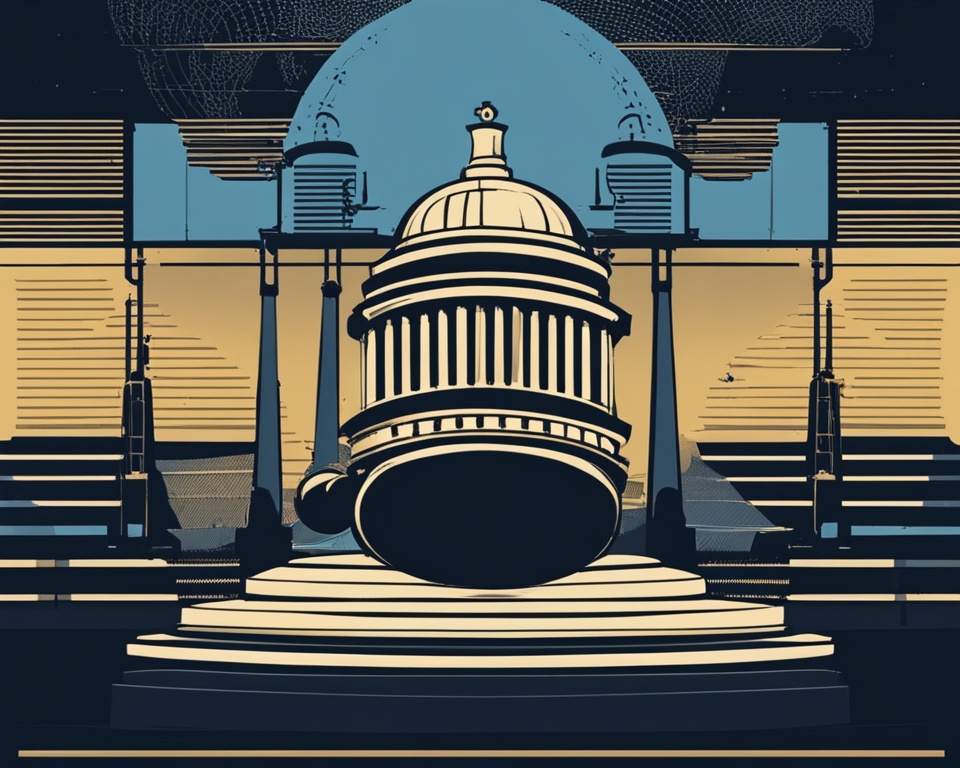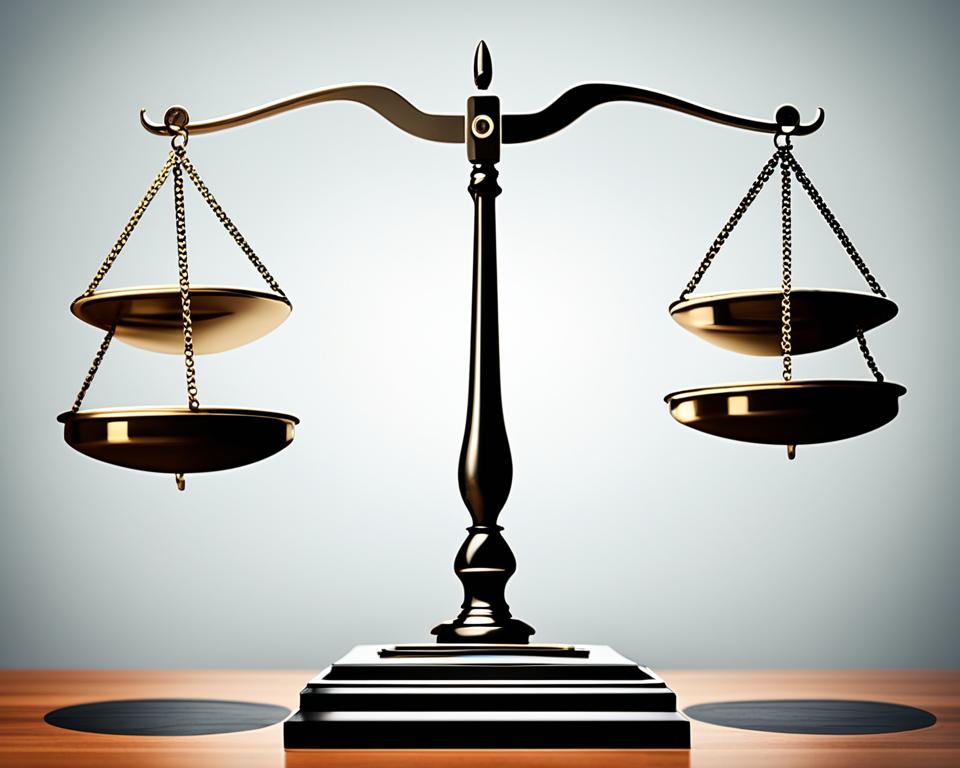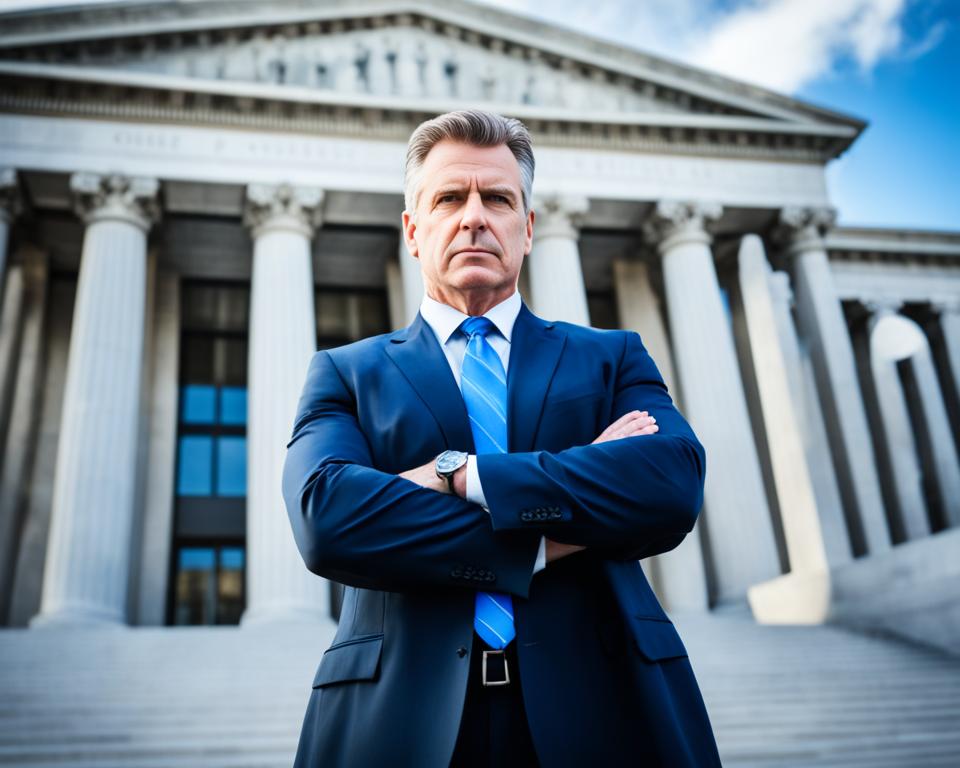Understanding criminal law is challenging. But, with a top-notch attorney, you’ll know your rights are safe. These lawyers are crucial in America’s justice system. They make sure everyone accused gets fair legal treatment and benefits fully from their knowledge.1 They defend even the most unpopular cases, question society’s norms, and fight the system’s big shots. In the U.S., their job is key to protecting our freedoms in a democracy.
Key Takeaways
- Criminal defense attorneys play a vital role in the American criminal justice system.
- They advocate for unpopular positions, challenge social values, and stand up to established powers.
- Their expertise and advocacy are essential for protecting civil liberties.
- The criminal justice system involves complex principles, procedures, and participants.
- Understanding the importance of criminal law defense can help appreciate the legal system’s complexities.
The Role of Criminal Defense Attorneys
Criminal defense attorneys take on crucial, sometimes unpopular tasks in the legal system. They stand up for ideas that many shun, question what society holds dear, and push back on the system’s norms. This work makes them important as watchdogs against abuse of power. They are often seen as rebels, not always liked by the mainstream law community or by those in power who prefer to skip legal steps.
Safeguarding Civil Liberties
Their work is key for keeping personal freedoms safe in countries like the U.S. They are essential in championing the rights of those accused of crimes. Their main goal is to win good results for their clients.2 Also, keeping what they learn to themselves is a huge part of their job. This is to make sure their clients feel safe sharing everything.
Advocating Unpopular Positions
They teach clients everything they need to know about the law and their specific case.2 A primary goal is to clear the client of all charges. This might mean digging deep into the case and using all the legal tricks available. If that’s not possible and the client is found guilty, the attorney tries to soften the blow. They aim to get the best outcome possible, arguing for less severe punishment based on certain facts.
Challenging Established Powers
It’s crucial for these attorneys to be very experienced and knowledgeable. This allows them to guide their clients through the complex legal process with the best defense strategies.2 People looking for a criminal defense lawyer should always do their homework to find a trustworthy one.2 John F. Greene, for example, has over 30 years of experience. He’s a top choice for clients in Florida, offering strong legal defense. To get his help, individuals facing legal charges can easily reach out online or by phone at (850) 424-6833.
Understanding the Criminal Justice System
Understanding criminal law means grasping the basics of our legal system. It’s about protecting rights and seeking justice.1 Criminal law covers harmful acts against society.1 It differs from civil law, which addresses personal disputes.1 Laws define crimes and their punishments as culture and technology change.1
Principles and Concepts
This system features many roles like police and judges. They work to protect rights and keep people safe, while also respecting freedoms.1
Defining Criminal Law
Criminal law classifies crimes into felonies, misdemeanors, and infractions.1 Felonies like murder and rape are the most serious. They can lead to long jail times or the death penalty.1 Misdemeanors, for acts such as theft, are less serious, resulting in fines or short jail stays.1 Infractions include minor traffic violations. They usually just lead to fines, not jail.1 Some states consider infractions to be civil matters.1
Law Enforcement and Prosecution
Law enforcement includes police and legal representatives. They ensure fair treatment and public safety.1 In court, a strong legal defense can lead to reduced charges or freedom.1 Punishment aims to reform, prevent future crimes, and give justice.1 Judges decide punishments based on many factors, like a criminal’s history or the use of a weapon.1
Criminal Law Defense
Criminal defense attorneys are key in safeguarding constitutional rights. They make sure those accused of crimes get a fair chance. This is crucial because most people don’t have the needed legal skills to defend themselves well.3 They help prevent wrongful convictions.3 These attorneys also work to address racial inequalities in the justice system.
They fight against unfair treatment during trials.3 This could be from prosecutors or judges. Their goal is to ensure everyone gets fair treatment under the law.3
Importance of Skilled Representation
Quality legal representation in criminal cases is extremely important. These attorneys know the ins and outs of the legal system. They make sure their clients’ rights are upheld all the way through the legal process.4
They are crucial in making sure trials are fair. They challenge any wrongdoing by the prosecution.4 This can improve the outcome for their clients, whether through negotiations, at trial, or even on appeal.4
Protecting Constitutional Rights
Defending constitutional rights is a central part of a criminal defense attorney’s work. They stand against too much government power. They make sure that everyone is treated fairly and legally.3
They are key in protecting important rights like being seen as innocent until proven guilty. They also ensure the right to a lawyer and a fair trial. These rights are the core of the justice system in the U.S.3
Ensuring Due Process
Ensuring that the process is fair is the lawyer’s job. They work to make sure the government proves its case properly. And, they work hard to defend their clients within the law.4
This includes everything from looking into cases, asking witnesses tough questions, to disputing the evidence against their clients. These efforts can change the outcome significantly, ensuring justice.4
Principles of Criminal Law
At the core of the criminal justice system are two key principles: mens rea and actus reus. These principles are crucial. They help decide if someone is guilty and what their punishment should be.
Mens Rea: The Guilty Mind
Mens rea means “guilty mind” in Latin. It speaks to a person’s mental state when they commit a crime. The law says criminals must have meant to do harm or shown negligence. This is important for determining if a person is truly at fault for a crime.
Actus Reus: The Criminal Act
In contrast, actus reus involves the actions of the crime. They must be deliberate. Even with a clear guilty intent, if no actual crime was done, there’s no case. Both the intent and the action are needed for a crime to occur under the law.
Getting a grip on these criminal law principles helps lawyers and regular folks understand the law better. It shows how the justice system works to determine who’s to blame for a crime.

Categories of Crimes
In criminal law, crimes are put into groups by how serious they are. There are three main categories: felonies, misdemeanors, and infractions.5
Felonies and Severe Penalties
Felonies are the most serious crimes. These include acts like murder, rape, and armed robbery. They have harsh penalties, like long prison time or even the death sentence.5
Misdemeanors and Lesser Offenses
Misdemeanors are less serious than felonies but still not light. They include actions such as vandalism and petty theft. The penalties could be working for the community, paying fines, or short jail stays.5
Infractions and Civil Offenses
Infractions are minor offenses, like small public disturbances or traffic violations. They often lead to getting a ticket or fine without jail time.5
The Criminal Procedure
The criminal justice system has a clear set of steps for handling a case. It starts with the arrest and moves through various stages to the final sentencing. It’s very important for officers to follow these steps closely. This helps protect the rights of those accused.6
Arrest and Charges
The process begins with an arrest and the laying of charges.6 Within two days of the arrest, the accused must go before a judge. The judge informs them of the charges and checks if there’s a sworn statement supporting the charges. At this point, the accused can choose to stay silent or get a lawyer. If they can’t pay for a lawyer, the state will provide one. They also have the right to have their lawyer with them during talks with the police.6
Preliminary Hearings and Plea Entry
After being arrested, the case moves to preliminary hearings and plea entry. In this phase, the charges are made formal. The defendant6 also pleads guilty or not guilty, which decides if the trial will move ahead. The judge makes sure the accused has enough time to talk to their lawyer. They also decide if the accused can leave by paying bail, if it’s allowed.6
Trial and Sentencing
Then, the case heads to trial. Here, evidence is shown, and a decision on guilt is made by a judge or jury. They also decide on the punishment. The rights of the accused, like having a lawyer, a fair trial, and being considered innocent until proven guilty, must always be respected.6

Key Participants in the Criminal Justice System
The criminal justice system has many key players. Each one is essential for making sure everything is fair and just. They all work together to follow the law, guard the rights of the accused, and promote real justice.
Judges and Fair Trials
Judges watch over legal proceedings. They see to it that trials are fair. They decide on legal matters, make sense of the law, and make sure everyone’s rights are safe.7 Judges are vital in making sure people are seen as innocent until proven guilty in a fair trial.
Prosecutors and Criminal Cases
Prosecutors stand for the government and the people. They bring charges in criminal cases. They collect evidence, talk to witnesses, and present their argument. The aim is to show the accused is guilty “beyond a reasonable doubt.”7 Prosecutors are key in making sure justice is done and victims are looked after.
Defense Attorneys and Protecting Rights
Defense attorneys represent the accused. Their job is to defend their clients, uphold their constitutional rights, and use legal strategies. This is to protect against untrue or exaggerated claims.7 They work hard to point out flaws in the prosecution’s case. This ensures their clients get a fair chance. Using strong legal strategies, they can win full acquittal or reduce the severity of charges and penalties.
Legal Defenses in Criminal Cases
When you’re charged with a crime, there are many legal defenses available. Your lawyer can use these to protect your rights and aim for a good outcome. These defenses help shield you from wrong or exaggerated charges.4
Self-Defense
Self-defense is used when someone acts to protect themselves. They claim they had to use force to avoid harm or death. This defense says their actions were necessary to stay safe.3
Insanity Defense
The insanity defense is for people with severe mental issues during the crime. They say they couldn’t understand what they were doing was wrong. Winning this defense might avoid jail but could mean treatment instead.3
Duress and Coercion
Duress defense is when someone commits a crime to avoid harm under someone else’s pressure. It admits the crime but says it was to stop a bigger harm.
These defenses can result in being found not guilty or getting lighter consequences, depending on the case details.43

Presumption of Innocence and Burden of Proof
The presumption of innocence is key in the Fifth Amendment, ensuring fairness. It makes the prosecution prove the defendant’s guilt beyond a reasonable doubt.8 They must also show the defendant’s defenses are not valid beyond a reasonable doubt.9 This rule helps prevent wrongly convicting innocent people.9
In criminal cases, the burden of proof lies with the government.9 They must show the accused is guilty beyond a reasonable doubt. This is rooted in the foundational idea that anyone accused of a crime is considered innocent until proven otherwise.9
The concept of reasonable doubt, critical in criminal law, is hard to pin down and varies by location.9 Judges guide juries by explaining this concept, pointing out the evidence must eliminate reasonable doubt.9 The government has to prove each aspect of the charged offense to the extent it leaves no room for doubt in the jury’s mind.9 Depending on the court’s location, the definition of reasonable doubt may differ, affecting how juries decide.9
The Sixth Amendment adds support for the presumption of innocence. It secures rights like a public trial, a fair jury, and facing one’s accusers.10 The prosecution, under the burden of proof, has to firmly support its case.10
Yet, the media and social influence can challenge the presumption of innocence. They might form public opinions before the legal process starts.10 Also, the right to bail is not absolute, especially when public safety could be at risk, but this should not affect the presumption of innocence.10 Defense lawyers are crucial in defending the presumption of innocence. They protect their clients’ rights and ensure a fair legal process.108
Criminal Punishments and Sentencing
Criminal punishments have goals beyond just punishing someone. They aim to help people change and prevent others from breaking the law.1 Punishments can be anything from small fines to serious consequences like the death penalty for very bad crimes.1
Fines and Monetary Penalties
When people commit small offenses, they might just have to pay a fine.1 These small crimes are called infractions. Usually, they don’t lead to jail time but a fine instead.1
Probation and Community Supervision
Probation means the criminal can stay in the community but under certain rules set by the court.11 People in Texas might get probation or face other penalties like fines and community service, depending on their case.11
Imprisonment and Capital Punishment
For more serious crimes, or if someone keeps breaking the law, they could end up in prison.1 Very severe crimes might lead to long prison sentences or even the death penalty in some states.1 In Texas, judges have a say in the type of punishment, which is why having a good lawyer is important.11
Judges look at many factors before deciding on a punishment, like how bad the crime was and whether the person has done wrong before.1 They aim to find the best balance between making someone pay for their crime, helping them change, and stopping others from doing the same crime.1
Mitigating and Aggravating Factors in Sentencing
Judges are key in deciding sentences for those found guilty in the criminal justice system. They weigh up mitigating factors and aggravating factors. For example, having no past criminal record or playing a small part in an offense could mean a shorter sentence. This is because they make the crime seem less serious.12 On the other hand, using a weapon in a crime or leading a criminal plan could mean a longer sentence. This makes the crime seem more severe.1213
It’s crucial for judges to find the right balance between punishment and the crime. They consider how serious the offense was and the person’s past criminal activity. They also look into situations that make the offense less serious or more serious.
This careful weighing is vital. It ensures that the punishment is right for the crime. It also maintains justice and fairness.13
| Mitigating Factors | Aggravating Factors |
|---|---|
|
|
In achieving the criminal justice system’s main goals, looking at these factors is crucial. These include punishment, the chance for change, and stopping others from offending.13 By taking these factors into account, judges ensure that each sentence is fitting for the case. This helps in being fair and just.

Conclusion
Criminal defense attorneys have a crucial job in the U.S. They defend people’s rights and make sure fair process happens in criminal cases.14 They use their skills to protect what our legal system promises us.
These lawyers help keep a balance between public safety and personal freedom. The legal system they work in is full of rules and with many people working together.14,15,16
Understanding criminal law shows why defense attorneys are so important.15,16 They stand up for your rights, challenge wrongs, and make sure justice is indeed fair. Even when it’s tough, they help keep our system honest.
We should all stand by these attorneys. They protect our freedoms and fight for justice for all.14,15,16 Knowing and respecting their work is key to keeping our justice fair and balanced.
FAQ
What is the role of criminal defense attorneys in the American criminal justice system?
What are the key principles and components of criminal law?
Why is skilled legal representation important in criminal cases?
What are some common legal defenses used in criminal cases?
How do judges determine sentencing in criminal cases?
Source Links
- https://online.law.pitt.edu/blog/understanding-the-basics-of-criminal-law
- https://www.destinattorneyjohngreene.com/what-are-the-responsibilities-of-a-florida-defense-lawyer/
- https://www.justia.com/criminal/defenses/
- https://kretzerfirm.com/common-legal-defenses-in-criminal-law-liability/
- https://www.monderlaw.com/what-4-categories-criminal-defenses/
- https://www.texasbar.com/AM/Template.cfm?Section=Our_Legal_System1&Template=/CM/ContentDisplay.cfm&ContentID=23456
- https://educaloi.qc.ca/en/capsules/the-players-in-a-criminal-court-case/
- https://www.criminallawyerofannarbor.com/what-is-the-presumption-of-innocence/
- https://www.mad.uscourts.gov/resources/pattern2003/html/patt4cfo.htm
- https://www.lawofficesofkeithnedwick.com/blog/2023/october/presumption-of-innocence-debunking-common-miscon/
- https://www.matthoraklaw.com/criminal-defense/sentencing-in-texas/
- https://www.justia.com/criminal/aggravating-mitigating-factors/
- https://www.dicindiolaw.com/blog/what-is-the-difference-between-aggravating-and-mitigating-factors/
- https://www.grahamdefense.com/resources/mock-trial-material/writing-opening-and-closing-statements/defense-closing/
- https://www.nolo.com/legal-encyclopedia/closing-argument-criminal-trials.html
- https://www.sciencedirect.com/topics/social-sciences/criminal-defense
